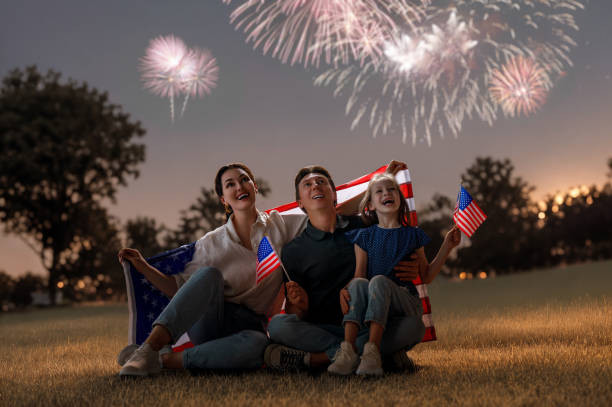Make Every Firework Count: Protect Your Hearing This Independence Day
Charlotte, United States - July 16, 2025 / Hearing Healthcare Centers /
The 4th of July dazzles with explosive celebrations and brilliant displays, yet fireworks pose a hidden risk—noise-induced hearing loss. This article explains how proper hearing protection can preserve your hearing health during these festivities. It highlights the risks of fireworks, the best protective devices, practical exposure tips, and innovative solutions for families, allowing you and your loved ones to celebrate safely.
Why Is Hearing Protection Essential for 4th of July Fireworks?
Fireworks generate intense noise that can permanently damage the ears. The high decibel levels may overwhelm the inner ear’s delicate sensory cells, causing immediate symptoms such as ringing (tinnitus) and discomfort. Over time, repeated exposure can lead to permanent hearing loss.
What Are the Risks of Noise-Induced Hearing Loss From Fireworks?
Even brief exposure to the high levels of sound can cause irreversible damage to the hair cells in the cochlea. This damage may result in diminished hearing acuity, persistent tinnitus, and increased sensitivity to sound, underscoring the need for protection during fireworks displays.
How Loud Are Fireworks and What Are Safe Noise Levels?
Fireworks can reach up to 150 decibels, which far exceeds the recommended safe exposure limit of around 85 decibels. Even short bursts at these levels can lead to auditory damage, hence experts suggest minimizing exposure duration and keeping a safe distance from the source.
Who Is Most Vulnerable to Hearing Damage on the 4th of July?
Those with pre-existing hearing conditions, children, older adults, or individuals with a family history of hearing loss are at higher risk. Extra caution and proper protective equipment are crucial for these vulnerable groups.
What Are the Best Hearing Protection Devices for Fireworks?
Selecting the right hearing protection devices is key during fireworks events, as these devices reduce the amount of loud noise reaching the ears. Devices such as earplugs and earmuffs are proven to lower decibel levels and safeguard hearing.
How Do Earplugs and Earmuffs Protect Your Hearing?
Both devices block or reduce the intensity of sound waves before they reach the ear canal. High-fidelity earplugs filter excessive noise while preserving speech, and earmuffs offer a physical barrier against high decibel levels. Proper use minimizes mechanical stress on sensitive ear structures during explosions.
Which Hearing Protection Is Most Comfortable for Long Celebrations?
For extended events, comfort is essential. Moldable earplugs provide a lightweight, custom fit while padded earmuffs with adjustable headbands offer both noise reduction and comfort, making them suitable for prolonged use.
Where Can You Buy High-Quality Hearing Protection for Fireworks?
Quality devices are available through medical supply stores, online retailers, and specialized hearing clinics. Look for brands recommended by audiologists with verified Noise Reduction Rating (NRR) values and positive customer reviews highlighting durability and effectiveness.
How Can You Prevent Hearing Loss While Enjoying 4th of July Celebrations?
Taking proactive steps can help you manage noise exposure and protect your ears. Regular use of hearing protection, coupled with planned breaks from loud environments, greatly reduces the overall risk of hearing damage while still allowing you to enjoy the festivities.
What Are Practical Tips for Safe Fireworks Noise Exposure?
Keep a safe distance from the display, use certified hearing protective devices, and consider noise-canceling techniques. Scheduling quiet intervals between bursts and avoiding direct exposure further help in managing the decibel load on your ears.
How Often Should You Take Hearing Breaks During Loud Events?
Taking a break every 15 to 20 minutes helps your auditory system recover from continuous noise exposure. Short periods of rest in quieter areas reduce the cumulative impact of loud sounds on your hearing.
When Should You Get a Hearing Test After Fireworks Exposure?
If you notice ringing, muffled hearing, or discomfort after exposure to fireworks, schedule a hearing test promptly. Early diagnosis through regular screenings can help prevent further deterioration.
What Are Common Hearing Health Issues Related to Fireworks Noise?
Common issues include tinnitus, temporary threshold shifts, and, in severe cases, permanent hearing loss. Such conditions result from the acoustic energy delivered by fireworks, which can overstrain and damage the inner ear’s hair cells.
How Does Tinnitus Develop From Fireworks Noise?
Tinnitus can occur when loud fireworks damage auditory hair cells, leading to a persistent ringing or buzzing sensation. Without proper protection, this condition may become chronic.
What Is Noise-Induced Hearing Loss and How Is It Diagnosed?
Noise-induced hearing loss is due to cumulative exposure to hazardous sound levels. It is typically diagnosed through audiometric tests that measure hearing thresholds at various frequencies. Early detection is key.
How Can Audiologists Help Protect Your Hearing?
Audiologists provide evaluations, recommend proper hearing protection products, and monitor auditory health through regular check-ups. Their expert advice helps in choosing preventive measures and managing any hearing impairments.
How Can Families Celebrate the 4th of July Safely With Healthy Hearing?
Families can celebrate this holiday by including hearing protection in their plans. Ensuring every member is protected from excessive noise maintains the festive spirit without compromising long-term hearing health. Educating everyone about noise risks and protective strategies is essential.
What Are Kid-Friendly Hearing Protection Options?
Child-specific options include smaller-sized soft foam earplugs and colorful earmuffs designed for a comfortable fit. These products keep even the youngest ears safe from the high-decibel blasts of fireworks.
How to Educate Family Members About Fireworks Noise Safety?
Use clear communication about the dangers of loud noise and the benefits of protective devices. Watching educational videos, attending community workshops, and discussing practical tips during pre-event planning can help everyone understand the need for precautions.
What Are Alternative Quiet Celebration Ideas for Sensitive Ears?
For individuals with sensitive hearing, alternatives like laser light shows, infrared displays, or community events with lower noise levels offer a way to celebrate without exposure to hazardous sound levels.
What Are the Latest Innovations in Hearing Protection for Fireworks?
Recent innovations include smart earplugs capable of monitoring and adjusting to ambient noise levels during fireworks. These devices balance protection with sound quality, providing an optimal listening experience while safeguarding hearing.
How Are Smart Earplugs Enhancing Hearing Safety?
Smart earplugs use digital sound processing to detect and automatically reduce sudden spikes in volume, protecting sensitive ear structures without interfering with necessary communication or environmental awareness.
What Materials Improve Comfort and Noise Reduction?
Premium devices often use high-grade silicone and memory foam, which effectively conform to the ear’s shape. This ensures long-lasting protection and optimal noise reduction during extended use at loud events.
How Does SoundGuard Hearing Solutions Support Healthy Hearing?
SoundGuard Hearing Solutions offers devices with advanced noise filtration and adjustable settings through app control. This enables users to customize their protection levels to the unique acoustic environment of fireworks displays.
Where Can You Find Reliable Information and Resources on Hearing Health for the 4th of July?
Reputable sources such as audiology centers, government health agencies, and specialized hearing clinics provide up-to-date information on hearing protection and safe listening practices during festive events.
What Are Trusted Sources for Hearing Protection Advice?
Organizations like the American Speech-Language-Hearing Association, local audiology clinics, and government health departments offer evidence-based guidelines. Their recommendations can help you choose the proper hearing protection devices.
How to Use Hearing Protection FAQs to Answer Common Questions?
Frequently Asked Questions sections on trusted websites offer concise, research-backed answers about protective devices, usage tips, and device maintenance, aiding consumers in making informed decisions.
How Can Community Programs Promote Hearing Safety During Fireworks?
Community workshops, free hearing screenings, and distribution of hearing protection gear during the 4th of July celebrations help raise awareness. These programs encourage proactive steps to preserve auditory health.
Frequently Asked Questions
Q: What decibel levels are fireworks typically?
A: Fireworks can reach up to 150 decibels, which is significantly above the safe exposure limit of 85 decibels, making hearing protection essential.
Q: Are smart earplugs effective for fireworks protection?
A: Yes, smart earplugs dynamically adjust sound levels, providing effective protection while maintaining situational awareness.
Q: How long should I wear hearing protection during loud events?
A: It is recommended to consistently wear hearing protection throughout the event and take regular breaks every 15–20 minutes to reduce cumulative exposure.
Q: When should I get my hearing evaluated after exposure to loud fireworks?
A: If you experience symptoms like ringing or muffled hearing after exposure, schedule a hearing test within a few days for early intervention.
Q: Can children use the same hearing protection as adults?
A: No, children require specially designed hearing protection to ensure proper fit and optimal noise reduction without causing discomfort.
Conclusion
Protecting your hearing during the 4th of July is both possible and essential. Using devices like earplugs and earmuffs significantly reduces the risk of noise-induced hearing issues. With smart innovations and family-friendly options available, you can safely enjoy fireworks while preserving your long-term auditory health.

Contact Information:
Hearing Healthcare Centers
5110 Park Road Ste 1C
Charlotte, SC 28209
United States
Greg Goin
https://hearbetternc.com/locations/hearing-center-in-charlotte-nc/
Original Source: https://hearbetternc.com/media-room/#/media-room


